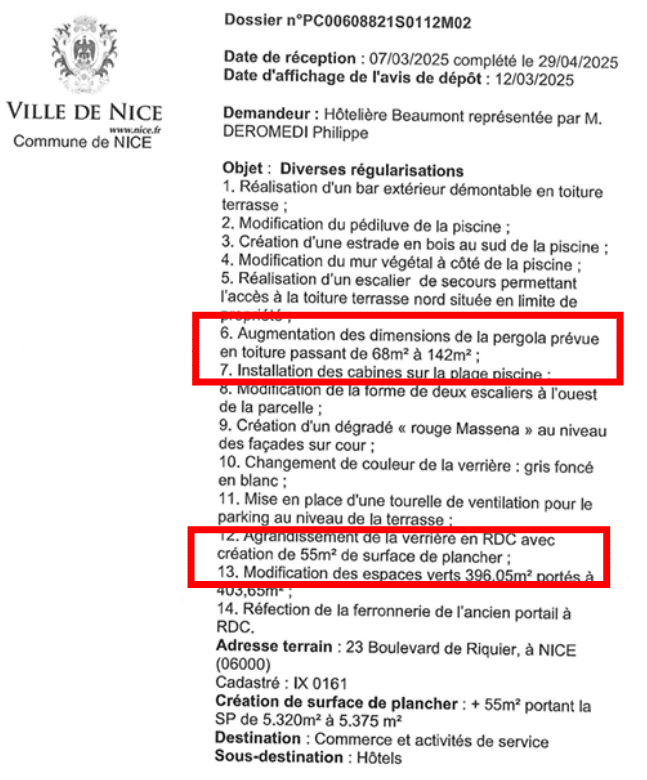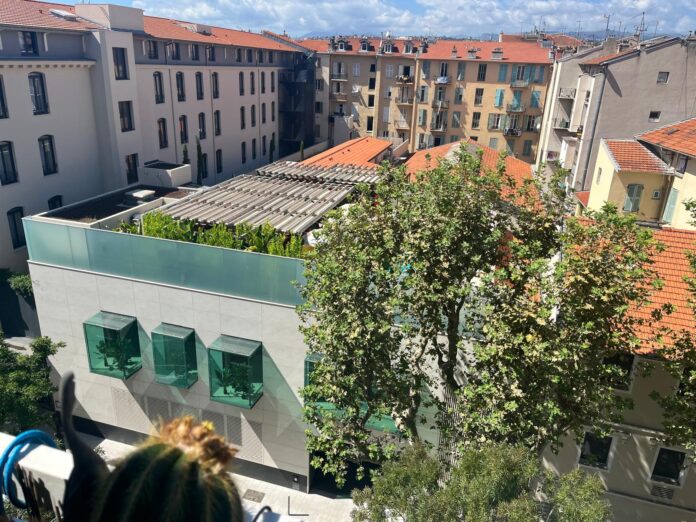Here’s the English translation of the provided French text:
Since the opening of the Mama Shelter hotel in the Riquier district in Nice on June 13, 2024, noise disturbances have been reported by the Mama Shelter Residents’ Collective.
The residents are at their wit’s end! Since spring 2024, many residents of the Riquier district have been angry. The reason? The activity of the Mama Shelter hotel at 21 Boulevard Riquier. The inhabitants have been enduring noise disturbances, both day and night, for more than a year. A situation that has become unbearable, according to many of the residents interviewed.
The Mama Shelter’s activity is almost non-stop. Some of these activities start in the morning from ten o’clock, while others end as late as two in the morning. These events, often musical, invade the residents’ homes in the buildings surrounding the hotel. Even with the windows closed, the noise is extremely present inside the apartments.
An “infernal smoking area”
In addition to the music coming from the hotel rooftop, the “smoking area” is a noise nest. Clients wishing to get some air find themselves in a cramped outdoor space. As a result, the noise rises up to the nearby apartments.
On the Boulevard Riquier side, residents complain about the noise disturbances caused by clients lingering in front of the entrance at extremely late hours. According to them, some security members contribute to these disturbances by chatting with the clients. Several clients interviewed revealed that they had been reprimanded for such behaviors by vigilant security staff.
A management closed to discussion
To express their exasperation, many residents have gathered. A petition has been signed by over a hundred people. They have tried to discuss the issue with Mama Shelter’s management, but nothing seems to really change. The collective has expressed their frustration over constant noise disturbances, which have made the situation unbearable. In response to these complaints, the director, Florence Dupont, reportedly delivered a blunt reply in September 2024: “I suggest you move”, was what the residents reportedly heard.
The residents, despite the difficult communication, have remained open to discussion, simply hoping for the situation to be resolved. While expressing their dissatisfaction to the hotel management, the collective members have not received a favorable response. In February 2025, Florence Dupont, the hotel manager, reportedly explained to the residents that “the schedule of events would intensify.”
A meeting with the municipality
A meeting was organized on September 4. Among those present were the Mama Shelter Residents’ Collective, Anthony Borré, deputy mayor, Jean-Marc Giaume, deputy for scientific culture, Philippe Soussi, lawyer for the city of Nice, a municipal police representative, and a city health services representative. The collective expects more than just promises from the city hall and the hotel: “we want written commitments and immediate actions.”
Florentin, a resident opposite the hotel, reported the statements made by Anthony Borré during the meeting he attended: “You will not be happy with what I’m about to say”, began the resident. “I do not celebrate the noise disturbances generated by the hotel, which I find unacceptable. I welcome this hotel that revitalizes a struggling district, bringing jobs to the people of Nice.”
The resident, in his view, sees more drawbacks to the creation of these jobs. At the time of writing, several signs from real estate agencies Century 21 and Laforêt Immobilier are displayed on both sides of the buildings on Arson and Barberis streets. “Niçois who live here year-round are fed up and can’t live here anymore. This entire area will turn into Airbnb, repeating the same process that happened ten or fifteen years ago in old Nice, Bonaparte street, and Place du Pin”, adds Florentin.
Demands and requirements
The citizens’ movement demands, for instance, that the rooftop be fully covered and enclosed with appropriate acoustic treatment. If the retractable roof is not covered and treated, according to them, the terrace should be cleared by 8 PM without exception. No concert, music, or any other noisy activity should take place there, regardless of the time of day.
The “smoking area” must be completely airtight; a simple glass enclosure will not suffice. On the contrary, it will amplify the resonance, according to the citizens’ movement. They want it to remain closed until these renovations are completed. According to the Mama Shelter Residents’ Collective, clients should no longer gather in front of the hotel. Lastly, the collective requests to be informed about the nature of any planned renovations.
Support from the municipality?
During our investigation, a document came to our attention. It is a building permit requested by Mama Shelter, authorized in March 2025 by the Nice city hall. Among the establishment’s requests is an increase in the dimensions of the planned pergola on the rooftop, from 68 to 142 square meters. It also notes an expansion of the ground-floor glass roof with the creation of 55 square meters of floor space.
No mention was made of covering the rooftop or creating a hermetic and isolated “smoking area” as requested by the citizens’ collective. On May 2, Christian Estrosi announced on BFM Côte d’Azur that he had issued a formal notice to the Anantara Plaza hotel due to residents’ complaints about noise disturbances. However, regarding the situation of Mama Shelter, the city hall remains idle.

What the law says about noise disturbances
As Bpifrance indicates in this document, “Anyone wishing to declare the opening of such an establishment must comply with both the regulations on beverage service […] This document also concerns establishments operating a dance floor where beverage service is not predominant.”
According to an interministerial circular from December 23, 2011, it defines the regulations for noise levels. “Articles R. 571-25 to R. 571-30, R. 571-92, and R. 571-96 of the Environmental Code impose obligations on establishments managed by public, private, or associative organizations that habitually broadcast amplified music. These obligations aim to protect neighbors, respect emergence values, protect public hearing, and comply with an average sound level of 105 decibels A.”
In September 2013, the High Council of Public Health proposed noise level measures to update regulations and protect individuals exposed to amplified music in leisure venues such as nightclubs, discos, concert halls, etc.
The risk levels for the ear vary according to the sound level measured in decibels A and the duration of exposure, ranging from 0 to 120 dBA. The dangers to the ear are reduced if exposure to 85 dBA lasts less than eight hours, or four hours at 88 dBA, or two hours at 91 dBA, or 15 minutes at 100 dBA.


